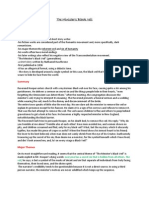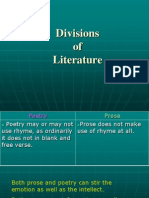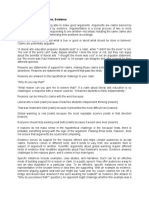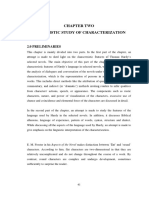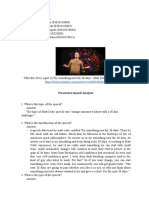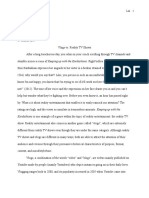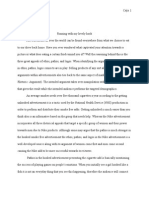Logos, Ethos and Pathos
Logos, Ethos and Pathos
Uploaded by
Carlos CoolCopyright:
Available Formats
Logos, Ethos and Pathos
Logos, Ethos and Pathos
Uploaded by
Carlos CoolCopyright
Available Formats
Share this document
Did you find this document useful?
Is this content inappropriate?
Copyright:
Available Formats
Logos, Ethos and Pathos
Logos, Ethos and Pathos
Uploaded by
Carlos CoolCopyright:
Available Formats
Logos, Ethos and Pathos
In short words:
Logos Logos is used to evoke a cognitive, rationale response. It is made by using definitions, factual data, quotations and things like that. It should appeal to our logic. Make things logical, understandable, and correct. A list of things you can use: - Theoretical, abstract language - Literal and historical analogies - Definitions - Factual data and statistics - Quotations - Citations from experts and authorities - Informed opinions
Ethos Ethos is used to make reliability between the sender and receiver. Make you trustworthy. To make a competence and create a mutual respect between both parts. A list of things you can use: - Language appropriate to audience and subject - Restrained, sincere, fair-minded presentation. - Appropriate level of vocabulary - Correct grammar Pathos Pathos speaks to the emotional part of your mind. It should make you feel, make your emotions flow. A list of things you can use: - Vivid, concrete language. - Emotionally loaded language. - Connotative meaning. - Emotional examples. - Vivid descriptions. - Narratives of emotional events. - Emotional tone. - Figurative language.
Definitions: Logos: The Greek word logos is the basis for the English word logic. Logos is a broader idea than formal logic--the highly sybolic and mathematical logic that you might study in a philosophy course. Logos refers to any attempt to appeal to the intellect, the general meaning of "logical argument." Everyday arguments rely heavily on ethos and pathos, but academic arguments rely more on logos. Yes, these arguments will call upon the writers' credibility and try to touch the audience's emotions, but there will more often than not be logical chains of reasoning supporting all claims. Ethos: Ethos is related to the English word ethics and refers to the trustworthiness of the speaker/writer. Ethos is an effective persuasive strategy because when we believe that the speaker does not intend to do us harm, we are more willing to listen to what s/he has to say. For example, when a trusted doctor gives you advice, you may not understand all of the medical reasoning behind the advice, but you nonetheless follow the directions because you believe that the doctor knows what s/he is talking about. Likewise, when a judge comments on legal precedent audiences tend to listen because it is the job of a judge to know the nature of past legal cases. Pathos: Pathos is related to the words pathetic, sympathy and empathy. Whenever you accept a claim based on how it makes you feel without fully analyzing the rationale behind the claim, you are acting on pathos. They may be any emotions: love, fear, patriotism, guilt, hate or joy. A majority of arguments in the popular press are heavily dependent on pathetic appeals. The more people react without full consideration for the WHY, the more effective an argument can be. Although the pathetic appeal can be manipulative, it is the cornerstone of moving people to action. Many arguments are able to persuade people logically, but the apathetic audience may not follow through on the call to action. Appeals to pathos touch a nerve and compel people to not only listen, but to also take the next step and act in the world.
Examples: Logos Let us begin with a simple proposition: What democracy requires is public debate, not information. Of course it needs information too, but the kind of information it needs can be generated only by vigorous popular debate. We do not know what we need to know until we ask the right questions, and we can identify the right questions only by subjecting our ideas about the world to the test of public controversy. Information, usually seen as the precondition of debate, is beter understood as its by product. When we get into arguments that focus and fully engage our attention, we become avid seekers of relevant information. Otherwise, we take in information passively--if we take it in at all. Christopher Lasch, "The Lost Art of Political Argument"
Ethos My Dear Fellow Clergymen: While confined here in Birmingham city jail, I came across your recent statement calling my present activities "unwise and untimely."...Since I feel that you are men of genuine good will and that your criticisms are sincerely set forth, I want to try to answer your statement in what I hope will be patient and reasonable in terms. I think I should indicate why I am here in Birmingham, since you have been influenced by the view which argues against "outsiders coming in."...I, along with several members of my staff, am here because I was invited here. I am here because I have organizational ties here. But more basically, I am in Birmingham because injustice is here. Just as the prophets of the eighth century B.C. left their villages and carried their "thus saith the Lord" far beyond the boundaries of their home towns, and just as the Apostle Paul left his village of Tarsus and carried the gospel of Jesus Christ to the far corners of the Greco-Roman world, so am I compelled to carry the gospel of freedom beyond my own home town. Like Paul, I must constantly respond to the Macedonian call for aid. Martin Luther King, Jr. "Letter from Birmingham Jail" Pathos For me, commentary on war zones at home and abroad begins and ends with personal reflections. A few years ago, while watching the news in Chicago, a local news story made a personal connection with me. The report concerned a teenager who had been shot because he had angered a group of his male peers. This act of violence caused me to recapture a memory from my own adolescence because of an instructive parallel in my own life with this boy who had been shot. When I was a teenager some thirtyfive years ago in the New York metropolitan area, I wrote a regular column for my
high school newspaper. One week, I wrote a colunm in which I made fun of the fraternities in my high school. As a result, I elicited the anger of some of the most aggressive teenagers in my high school. A couple of nights later, a car pulled up in front of my house, and the angry teenagers in the car dumped garbage on the lawn of my house as an act of revenge and intimidation. James Garbarino "Children in a Violent World: A Metaphysical Perspective"
You might also like
- Leadership CommunicationDocument30 pagesLeadership CommunicationAmirah Ali100% (1)
- Eng 111 RhetoricalDocument2 pagesEng 111 Rhetoricalapi-459982164100% (1)
- Unit Argument Persuasion Analyzing Ethos Logos Pathos in Short Persuasive TextsDocument6 pagesUnit Argument Persuasion Analyzing Ethos Logos Pathos in Short Persuasive TextsJonard Joco100% (2)
- Persuasive Analytical Essay ExampleDocument5 pagesPersuasive Analytical Essay Examplefreshlimesoda100% (1)
- The Turn of The ScrewDocument4 pagesThe Turn of The Screwapi-440036259No ratings yet
- Types of DebatingDocument4 pagesTypes of DebatingTindy B. RasmaningtyaNo ratings yet
- "The Cask of Amontillado": Edgar Allan Poe's Use of Mood inDocument1 page"The Cask of Amontillado": Edgar Allan Poe's Use of Mood inAndreamae GonzalesNo ratings yet
- Fight Club Rhetorical AnalysesDocument7 pagesFight Club Rhetorical AnalysesJerKasey100% (1)
- The Keys To Persuasion Ethos Logos PathosDocument3 pagesThe Keys To Persuasion Ethos Logos PathosJohn LukezicNo ratings yet
- Elements of The PlotDocument9 pagesElements of The PlotTugay PlorNo ratings yet
- How To Detect Bias in News MediaDocument2 pagesHow To Detect Bias in News Mediaapi-326843214No ratings yet
- Level 7 Analogies 2Document3 pagesLevel 7 Analogies 2John Alvin DelavinNo ratings yet
- BELGICA VS OCHOA GR No 208566 2013-11-19Document169 pagesBELGICA VS OCHOA GR No 208566 2013-11-19Junisa Duluan KimamaoNo ratings yet
- Pragmatics - Short QuizDocument2 pagesPragmatics - Short QuizMarianne ChristieNo ratings yet
- Notes On Literary CriticismDocument9 pagesNotes On Literary CriticismLucky AnnNo ratings yet
- Nathaniel HawthorneDocument2 pagesNathaniel HawthorneAndreea ChirilaNo ratings yet
- Milton's Samson Agonistes 1890, MacmillanDocument245 pagesMilton's Samson Agonistes 1890, MacmillanCláudia AlvesNo ratings yet
- Lincoln Douglas DebateDocument2 pagesLincoln Douglas DebateJohnnyNo ratings yet
- Argumentative Essay Lesson PlanDocument4 pagesArgumentative Essay Lesson PlanJacob Walse-DominguezNo ratings yet
- The Origins of Human Language (Robert)Document16 pagesThe Origins of Human Language (Robert)Thar Lun NaingNo ratings yet
- Writing An Editorial or Opinion ColumnDocument2 pagesWriting An Editorial or Opinion ColumnTashfeen YousafNo ratings yet
- Thesis StatementsDocument3 pagesThesis Statementsmslenihan100% (1)
- Divisions of LiteratureDocument42 pagesDivisions of LiteratureLiza D. MataNo ratings yet
- 21st Century LiteratureDocument5 pages21st Century LiteratureWenzie S. FernandezNo ratings yet
- Lesson 1 - Language Used in Academic WritingDocument54 pagesLesson 1 - Language Used in Academic WritingKristal EntrinoNo ratings yet
- A Short Critical of The Waste Land by T.S EliotDocument3 pagesA Short Critical of The Waste Land by T.S EliotMartyn SmithNo ratings yet
- Analyzing The Different Intrinsic ElementsDocument14 pagesAnalyzing The Different Intrinsic ElementsAtika Ayu NuraniNo ratings yet
- The Birth of Campus Journalism in The PhilippinesDocument5 pagesThe Birth of Campus Journalism in The PhilippinesMarliel P. CastillejosNo ratings yet
- 831 LiteratureDocument12 pages831 LiteratureEsther Joy HugoNo ratings yet
- Logos Ethos PathosDocument1 pageLogos Ethos PathosEd CormodeNo ratings yet
- Types of Speech StyleDocument16 pagesTypes of Speech StylecassNo ratings yet
- Rules of DebateDocument9 pagesRules of DebatePrinceAndreNo ratings yet
- Literature HandoutDocument11 pagesLiterature HandoutJealyn FloresNo ratings yet
- Other Models of SLADocument14 pagesOther Models of SLAJasper John RoqueNo ratings yet
- Linguistic Featuresin ChinuaDocument13 pagesLinguistic Featuresin ChinuaAida KurtalićNo ratings yet
- Intro To Logical FallacyDocument35 pagesIntro To Logical FallacyanthonneacNo ratings yet
- Topic SentenceDocument6 pagesTopic Sentencerotsacreijav666666No ratings yet
- Tupal Vs RojoDocument2 pagesTupal Vs RojoacAc acNo ratings yet
- Homonyms: Grigoryeva MDocument37 pagesHomonyms: Grigoryeva MMarrianne FranciscoNo ratings yet
- Short StoryDocument67 pagesShort StoryJohnlloyd FernandezNo ratings yet
- Receptive and Productive GrammarDocument6 pagesReceptive and Productive GrammarĐặng Thị Ngọc PhụngNo ratings yet
- Logos, Ethos and PathosDocument1 pageLogos, Ethos and PathosMatthew LambertiNo ratings yet
- Specom SyllabusDocument6 pagesSpecom Syllabusiris virtudezNo ratings yet
- Speech Analysis: How To Study and Critique A SpeechDocument4 pagesSpeech Analysis: How To Study and Critique A SpeechShiela RengelNo ratings yet
- Language Society and CultureDocument8 pagesLanguage Society and Cultureapi-3716467100% (6)
- War QuestionsDocument2 pagesWar QuestionsbehnamsorinNo ratings yet
- Business Letter WritingDocument13 pagesBusiness Letter WritingAlex Alexandru100% (1)
- Media BiasDocument36 pagesMedia BiasMatthew Lloyd100% (2)
- Denotation and ConnotationDocument3 pagesDenotation and ConnotationMuhammad ArliandiNo ratings yet
- Elements of Drama PDFDocument11 pagesElements of Drama PDFshirly castroNo ratings yet
- Introduction To Sound Devices in Poetry Education Presentation in White Blue Friendly Hand Drawn StyleDocument27 pagesIntroduction To Sound Devices in Poetry Education Presentation in White Blue Friendly Hand Drawn StyleTrixie Andrea TeodoroNo ratings yet
- Lesson Plan Persuasive Techniques1Document3 pagesLesson Plan Persuasive Techniques1api-299888967No ratings yet
- Yuri Lotman - Poetry and Prose PDFDocument11 pagesYuri Lotman - Poetry and Prose PDFumar0456No ratings yet
- Metrical Patterns PDFDocument5 pagesMetrical Patterns PDFAlcel PascualNo ratings yet
- Reading HypertextDocument11 pagesReading HypertextDana AnduyanNo ratings yet
- The Verb TensesDocument3 pagesThe Verb Tensesflavia1091No ratings yet
- Himmelmann Descriptive LinguisticsDocument34 pagesHimmelmann Descriptive LinguisticsMAIRA FERNANDA GUZMAN GARCÍANo ratings yet
- A Task-Based Approach - Teachingenglish - British Council - BBCDocument2 pagesA Task-Based Approach - Teachingenglish - British Council - BBCmllekiwiNo ratings yet
- An Appeal To Authority and Credibility. Ethos Is A Means of ConvincingDocument12 pagesAn Appeal To Authority and Credibility. Ethos Is A Means of Convincingjhon valdiviezoNo ratings yet
- RhetorichandoutDocument2 pagesRhetorichandoutapi-322718373No ratings yet
- Ethos Pathos and LogosDocument3 pagesEthos Pathos and LogosJuan TropaNo ratings yet
- 3 Appeals Notes and ExamplesDocument7 pages3 Appeals Notes and Examplesvernon whiteNo ratings yet
- Answers To Practice For Ethos Pathos Logos Rhetorical Devices and ToulminDocument5 pagesAnswers To Practice For Ethos Pathos Logos Rhetorical Devices and ToulmindianeNo ratings yet
- Rhetorical Analysis Essay GuidelinesDocument2 pagesRhetorical Analysis Essay Guidelineselizabeth_lenherr100% (1)
- Logos Ethos PethosDocument12 pagesLogos Ethos Pethosapi-365153594No ratings yet
- Argument: Claims, Reasons, EvidenceDocument8 pagesArgument: Claims, Reasons, EvidencerouNo ratings yet
- Module 3 Purposive CommunicationDocument3 pagesModule 3 Purposive CommunicationDalde DinaNo ratings yet
- Rustic Characters PDFDocument39 pagesRustic Characters PDFShahnawaz HussainNo ratings yet
- AppuDocument226 pagesAppuvinivasu06No ratings yet
- How To Write A Critical Analysis - 17 Steps - WikiHowDocument6 pagesHow To Write A Critical Analysis - 17 Steps - WikiHowdrfleetNo ratings yet
- Rhetorical Analysis Significant RevisionsDocument13 pagesRhetorical Analysis Significant Revisionsapi-358667094No ratings yet
- Audience Analysis ReportDocument6 pagesAudience Analysis ReportSanchez, Vhon Cedric B.No ratings yet
- ENGLISH REVIEWER 2nd QuarterDocument21 pagesENGLISH REVIEWER 2nd QuarterMatt Uriel De VillaNo ratings yet
- Rhetorical Analysis Essay DraftDocument11 pagesRhetorical Analysis Essay Draftapi-378241670No ratings yet
- Mimesis and Motivation: The Two Faces of Fictional Coherence - Meir SternbergDocument156 pagesMimesis and Motivation: The Two Faces of Fictional Coherence - Meir SternbergJônathas AraujoNo ratings yet
- Persuasive Technique ChartDocument2 pagesPersuasive Technique Chartapi-260339450No ratings yet
- Portfolio Elements of Persuasion ObamaDocument13 pagesPortfolio Elements of Persuasion Obamaapi-279291777No ratings yet
- Intro To AP LangDocument32 pagesIntro To AP LangYuanshengNo ratings yet
- Ethics-Moral PhilosophyDocument12 pagesEthics-Moral PhilosophyFCNo ratings yet
- A Guide To Aristotles RhetoricDocument54 pagesA Guide To Aristotles RhetoricKatherine Sylwester100% (3)
- Persuasive Speech AnalysisDocument3 pagesPersuasive Speech AnalysisAlya nur CholisahNo ratings yet
- Kardashians Is One Example of A Genre Within The Topic of Reality Entertainment: The Reality TVDocument7 pagesKardashians Is One Example of A Genre Within The Topic of Reality Entertainment: The Reality TVapi-350978037No ratings yet
- "On The End of Rhetoric, Classic and Modern" - S.M. HalloranDocument12 pages"On The End of Rhetoric, Classic and Modern" - S.M. HalloranCaitlinNo ratings yet
- Retorical Analysis NewDocument6 pagesRetorical Analysis Newapi-242783757No ratings yet
- Eng 101 Project 2 - Fall 2019Document10 pagesEng 101 Project 2 - Fall 2019api-489847809No ratings yet
- Ehos Pathos Logos EssayDocument5 pagesEhos Pathos Logos Essayapi-285644021No ratings yet
- DP Paper 1 Cassete Ad AnalysisDocument1 pageDP Paper 1 Cassete Ad AnalysisTanay ShahNo ratings yet
- Lecture 2 Introduction To ArgumentationDocument30 pagesLecture 2 Introduction To ArgumentationG. McGhieNo ratings yet
- Eastern and Western Feminist Literary CriticismDocument8 pagesEastern and Western Feminist Literary CriticismIrza AnwarNo ratings yet
















